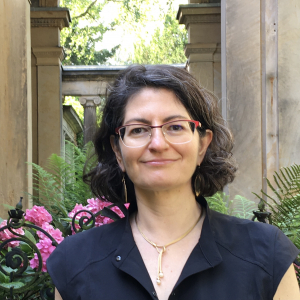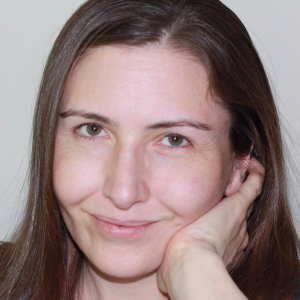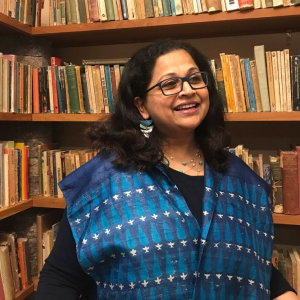Trinity Communications
Four faculty from Duke’s Trinity College of Arts & Sciences and three alumni have been named to this year’s cohort of Guggenheim Fellows.
The honorees for 2023 include German Studies Professor Stefani Engelstein, Professor Lillian B. Pierce of Mathematics, Religious Studies Professor Leela Prasad, and Professor of Physics Christopher Walter. Duke alumni Lucy Corin, Jon-Sesrie Goff and Jennifer Graber were also recognized.
Now in its 98th year, the Guggenheim Fellowships recognize exceptional mid-career scholars and artists working in any field of knowledge or artform, under the freest possible conditions.

Stefani Engelstein has always been interested in how definitions are made and how boundaries are drawn, and has recently turned these questions towards Western ideas of sex, gender and sexuality. The fellowship from the Guggenheim Foundation will enable her to continue and expand her work into a forthcoming book, “The Making of Oppositional Sexes.”
Engelstein’s research will investigate how sex came to be viewed as opposite and mutually completing rather than merely other. Looking at literature, philosophy, science, and medicine of the late 18th century, Engelstein will connect the modern view of sexual difference to a larger theory of dynamic opposition that arose as naturalists shifted focus from anatomy to physiology.
Compared at the time to the physics of electricity and of magnetism, polar opposition of the sexes was thought to lead to attraction and then union. The cyclical nature of felt attraction, physiological union, and reproduction of the next generation created the impression of a continuous system that could serve as a stable foundation for knowledge of the natural world, interpersonal ethics, and social structure. While the idea has had lasting impact, there were also always dissenting voices. Engelstein will trace the roots of current political and legal debates in United States today back to this history.
“The categories that we have in the world, the way that we think about the world — those things have histories and we're frequently not aware of it,” Engelstein said in a recent interview. “I think it's important for people to be aware of the series of choices and coincidences that created things that we think are permanent and unchanging.”
In addition to her research, Engelstein serves as Co-Director of Graduate Studies for the Carolina-Duke Graduate Program in German Studies, a graduate program that combines the resources of both Duke and UNC. She was also recently awarded Fellowships from the National Endowment for Humanities and Fulbright Scholar Program.

Lillian B. Pierce is the Nicholas J. and Theresa M. Leonardy Professor of Mathematics at Duke and holds a visiting Bonn Research Chair at the Hausdorff Center for Mathematics. Her research spans analytic number theory and harmonic analysis, as she investigates properties of integers and functions and the interplay between the two.
"Historically, each field (number theory and harmonic analysis) has had its own terminology, its own tools and its own taste for what makes an interesting problem," Pierce said. At the time she started graduate school, the expectation was that Pierce would choose among the two fields. Instead, she developed an unusual fluency in both.
"Over roughly the past 10 years, a number of striking discoveries by various research teams have shown that the apparent boundary between the fields is deceptive," she explained. "Now, young researchers are very interested in getting up to speed on technical ideas that interact with both fields, but it isn’t particularly easy to do so."
The Guggenheim Fellowship will enable her to make progress on the absorbing work of a long-term writing project — one initiated with her late friend and collaborator Elias M. Stein — which will provide an expansive introduction to one part of the intersection of number theory and analysis.
"The time is right for a text that will help researchers and students gain bilingual fluency in the tastes and tools of both fields via a united presentation," Pierce said.
Pierce is the editor-in-chief of the journal Essential Number Theory, which she founded in collaboration with Duke alumna Melanie Matchett Wood, a professor at Harvard. She is the recipient of a Sloan Research Fellowship, an National Science Foundation CAREER grant, and has given numerous distinguished lectures.

Leela Prasad works at the intersection of religious studies, anthropology, history and literature and is Director of Undergraduate Studies in the Department of Religious Studies at Duke. The Guggenheim Fellowship will advance her interest in the resonance of Gandhi in carceral contexts.
Prasad’s research is inspired by her experience regularly teaching a graduate course on Gandhi’s modernity in federal and state prisons in North Carolina, and her fieldwork in India with Gandhi-inspired individuals who have served prison terms, and still navigate circumstances rife with dehumanizing inequities, stigma, and violence.
“I am grateful to these individuals who have shown me that to hope is also a human right,” Prasad said. “I am honored to receive the Guggenheim Fellowship, which will allow me to write a book about how Gandhian nonviolence can become a methodology of everyday life even amidst specters of crime.”
Prasad co-directed The Carceral Imaginary Working Group at the John Hope Franklin Humanities Institute at Duke and is a core faculty member of the Prison Engagement Initiative. She was awarded the 2019 Dean’s Award for Excellence in Mentoring by Duke's Graduate School, two Fulbright fellowships, and grants from the American Academy of Religion, the National Endowment for the Humanities and the American Philosophical Society.
Prasad’s first book, “Poetics of Conduct: Narrative and Moral Being in a South Indian Town,” won the American Academy of Religion’s “Best First Book in the History of Religions Prize.” Prasad demonstrated that storytelling and practices like cooking or vernacular architecture reveal ethical imagination. Her second book “The Audacious Raconteur: Sovereignty and Storytelling in Colonial India” argues that oppressive forces can never erase or conquer creativity. She is co-directing a film called “Moved by Gandhi.”
In 2022, Prasad was elected Vice President of the American Academy of Religion and will become its President in 2024.

Chris Walter is a cosmologist and particle physicist working on understanding the nature of dark energy, the almost entirely unknown property responsible for the accelerating expansion of the Universe.
In order to understand the Universe, one has to look at the sky, and Walter has been working on the Vera Rubin Observatory in Chile for the past decade. Equipped with an 8.4 m telescope and a 3,200-megapixel camera, the observatory will take images every three nights, completing an unprecedented 10-year, three-dimensional survey of the entire visible sky.
Walter spent 2022 on sabbatical in Chile, working hands-on in building and commissioning the observatory, which is currently less than two years away from beginning its operations. The Guggenheim fellowship will allow him to spend an additional year on site, testing hardware systems and leading efforts to build the tools used to simulate and perfect the images obtained by the observatory.
Due to his experience interacting with students in both a classroom and a research environment, Walter is also working hard to ensure that the research environment at the observatory is suitable for students and researchers at all stages of their careers.
At Duke, Walter launched a thriving cosmology program in the Physics department. His research has been continuously funded by both the NSF and the Department of Energy (DOE). In addition to working on the Vera Rubin Observatory, Walter is also involved in high energy physics experiments in Japan. He oversees the large DOE grant that funds the entire Duke particle physics program for work in Chile, Japan, the Fermilab in Chicago and the Large Hadron Collider in Switzerland.
"I feel extremely honored to be recognized with a Guggenheim Fellowship,” said Walter. “I’m particularly proud to be associated with scholars and artists from across such a wide range of the humanities, arts and sciences. The fellowship is very important for me personally, and for our cosmology group here at Duke.”
Acclaimed for her stories of unstable people and how their lives affect loved ones, Lucy Corin ’92 majored in English as a Duke undergraduate and most recently published the novel “The Swank Hotel.” Her work, which has been praised for its “unforgettable, surreal, and unexpectedly comic writing,” also includes the story collections “One Hundred Apocalypses and Other Apocalypses” and “The Entire Predicament,” and the novel “Everyday Psychokillers: A History for Girls.”
She is the recipient of an American Academy of Arts and Letters Rome Prize and a literature fellowship from the National Endowment for the Arts. She teaches at the University of California at Davis and lives in Berkeley.
Jon-Sesrie Goff '16, who earned his MFA in experimental and documentary arts from Duke, is a multidisciplinary artist, curator and arts administrator. His personal documentary focuses on institutional, community and personal archival research, visual documentation, and oral history interviews in the coastal South on the legacy of Black land ownership and Gullah Geechee heritage preservation.
Goff has been involved in a variety of award-winning documentaries, and his recent feature-length directorial debut, “After Sherman,” (2022) has been acclaimed for its poetic, intimate account of the lives of the Black community in the filmmaker's Black Belt hometown, on land that has been in his family for 150 years, where they were once enslaved.
Jennifer Graber ’06 is the Gwyn Shive, Anita Nordan Lindsay and Joe & Cherry Gray Professor of Religious Studies and Associate Director of Native American and Indigenous Studies at the University of Texas at Austin. She earned her Ph.D. from Duke’s Graduate Program in Religion, a collaboration between Trinity’s Department of Religious Studies and Duke Divinity School.
Graber studies Native American religions, religion and violence, and inter-religious encounters in American prisons and on the American frontier. Her books include The Furnace of Affliction: Prisons and Religion in Antebellum America – about the intersection of church and state during the founding of the nation's first prisons – and The Gods of Indian Country: Religion and the Struggle for the American West, which considers religious transformations among Kiowa Indians and Anglo Americans during their conflict over Indian Territory, now known as Oklahoma. Her new project focuses on Native actors, sources, and epistemologies in the so-called Ghost Dance of 1890.